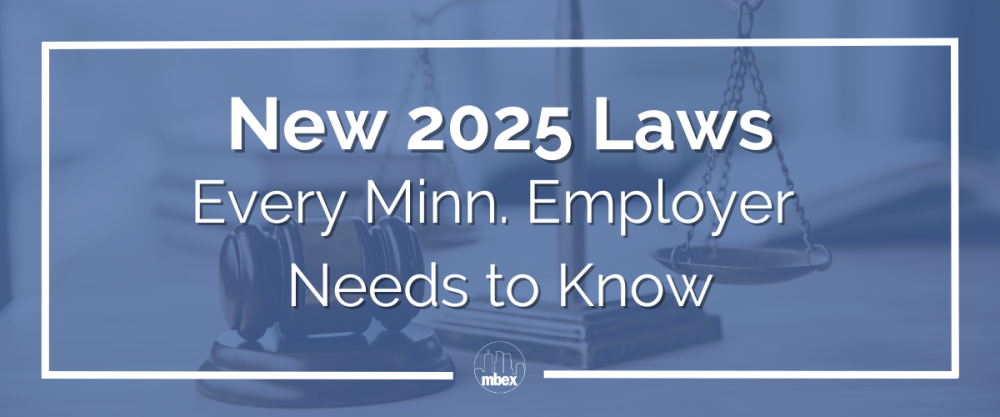
A fresh year always brings fresh updates, and for Minnesota employers, 2025 has a lot to unpack.
From pay transparency to updated sick leave rules, here’s a straightforward. no-fuss rundown of what’s new and how it could impact your business.
PAY & BENEFITS TRANSPARENCY (2025)
Starting January 1, 2025, a new statewide pay-transparency law for employers with 30 or more employees is in place. Under Minnesota Statutes 181.173, job postings must now include:
• The starting salary range (no more "open ranges").
• A general description of benefits and other compensation (think health insurance, retirement plans, etc.).
• This applies to postings across the board --- whether online, in print, or through third-party recruiters.
Bother the Minnesota Department of Labor and Industry and the Attorney General's office will enforce compliance.
The goal? To level the playing field by addressing disparities in compensation. Minnesota's not alone here; states like California, New York, and Colorado have similar laws. If you're hiring across multiple states, now's a good time to ensure you're meeting all the rules.
AMENDED SICK AND SAFE TIME REQUIREMENTS (2025)
Minnesota’s Earned Sick and Safe Time (ESST) law has been around since 2024, but amendments in 2025 bring some important tweaks:
• Using PTO for ESST Purposes: Employers can now use PTO for ESST-eligible reasons, even after exhausting their ESST balance.
• Expanded reasons: Funeral leave is now included under ESST-qualifying purposes.
• Recordkeeping: Employers must retain ESST-related records for at least three years.
With these changes, it's a good idea to revisit their PTO and ESST policies to ensure that everything is up to date.
MINIMUM WAGE RATE HIKE (2025)
At the start of the year, Minnesota's minimum wage has gone up to $11.13 an hour.
While this applies statewide, don't forget to check for higher rates in Minneapolis and St. Paul if you're operating in them. A training wage is still available for workers under 20 years of age, but double-check those city ordinances to avoid hiccups.
MINNESOTA HUMAN RIGHTS ACT CHANGES (2024)
Changes to the Minnesota Human Rights Act (MHRA) in August 2024 carry big implications for employers:
• Unlimited Punitive Damages: The previous $25,000 cap is gone, so penalties for violations could be steep.
• Jury Determinations: Juries, not judges, now decide the extent of damages in discrimination cases.
• Expanded "Disability" Definition: This now includes conditions that are episodic or in remission but would limit major life activities when active.
• More Time to File Claims: Employees now have 90 days to file a lawsuit after receiving a dismissal notice from the Minnesota Department of Human Rights (MDHR).
Make sure your policies align with these updates to avoid costly mistakes.
MISCLASSIFICATION OF EMPLOYEES AS INDEPENDENT CONTRACTORS & NEW RULES FOR CONSTRUCTION COMPANIES (2025 and 2024)
Independent Contractor Misclassification: Starting July 1, 2024, misclassifying employees as independent contractors can cost you up to $10,000 per violation. Additional penalties apply for obstructing investigations.
Construction Industry-Specific Rules: As of March 1, 2025, construction companies face new criteria for classifying workers. A 14-factor test now determines whether a worker is an independent contractor. Penalties are steep, with up to $10,000 per misclassification and potential individual liability for repeated violations.
ELECTRONIC TIPS TO WORKERS (2024)
As of August 2024, all electronic tips—whether from a card or an app—must be given in full by the next pay period to the employee. If your business relies on tipped workers, this one's a no-brainer to implement.
Change can feel overwhelming, but staying ahead of compliance is crucial. Now’s the time to review your policies, update handbooks, and ensure your team is trained on these new requirements.
Got questions? Reach out to legal counsel or a trusted HR professional for guidance.
--------
This information was pulled from "The Work Week with Bassford Remele" newsletter, published on January 6, 2025 (read it here). The attorneys at Bassford Remele's Employment Law practice group have extensive experience advising employers on these and other new and changing laws, regulations, and ordinances, from federal to local. Please reach out to any of their team members for guidance, questions, or further assistance.